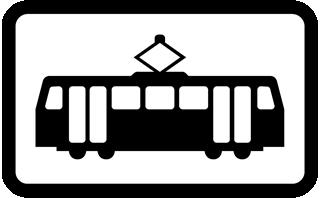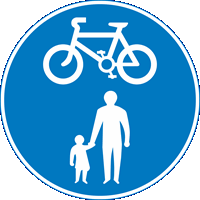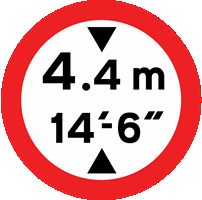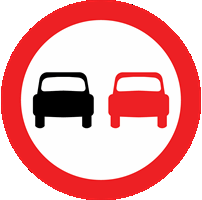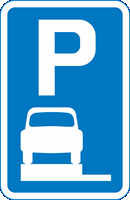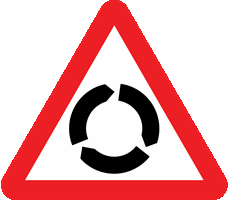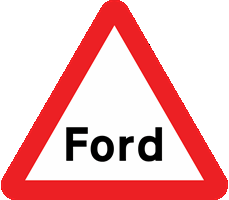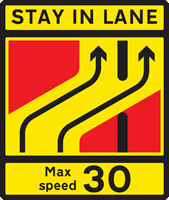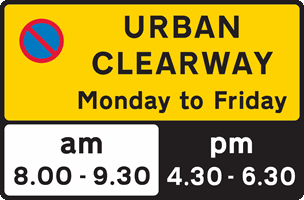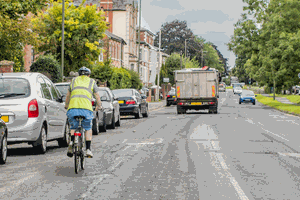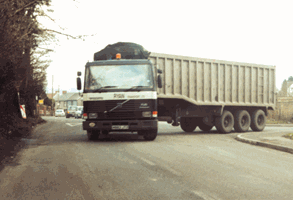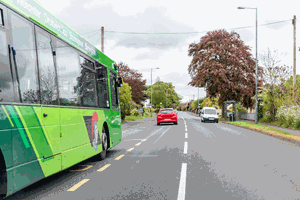You have 57 minutes to answer 50 multiple choice driving theory test questions. You need to answer at least 43 out of 50 questions correctly to pass. You can review your answer after each question or you can review all of your answers at the end of the test. Best of luck!
Test Quick View
Click on an answer to view the correct choice along with the explanation.
Correct Answer: A
Explanation: If people are waiting to use a pedestrian crossing, slow down and be prepared to stop. Don't wave them across the road since another driver may not have seen them, not have seen your signal and may not be able to stop safely.
Explanation: If people are waiting to use a pedestrian crossing, slow down and be prepared to stop. Don't wave them across the road since another driver may not have seen them, not have seen your signal and may not be able to stop safely.
اگر لوگ سڑک پار کرنے کا انتظار کررہے ہیں تو آہستہ ہوجائیں اور رکنے کے لئے تیار رہیں۔ انہیں سڑک پار کرنے کا اشارہ مت کریں کیونکہ ہوسکتا ہے کہ دوسرے ڈرائیور نے انہیں نہ دیکھا ہو، آپ کا اشارہ نہ دیکھا ہو اور بحفاظت رک نہ سکتا ہو۔
Correct Answer: A
Explanation: Emergency vehicles use blue flashing lights. If you see or hear one, move out of its way as soon as it's safe and legal to do so.
Explanation: Emergency vehicles use blue flashing lights. If you see or hear one, move out of its way as soon as it's safe and legal to do so.
Correct Answer: B
Explanation: Trams are powered by electricity and therefore don't emit exhaust fumes. They ease traffic congestion by offering drivers an alternative to using their car, particularly in busy cities and towns.
Explanation: Trams are powered by electricity and therefore don't emit exhaust fumes. They ease traffic congestion by offering drivers an alternative to using their car, particularly in busy cities and towns.
Correct Answer: B
Explanation: This sign shows a shared route for pedestrians and cyclists: when it ends, the cyclists will be rejoining the main road.
Explanation: This sign shows a shared route for pedestrians and cyclists: when it ends, the cyclists will be rejoining the main road.
A
B
C
D
B
C
D
Correct Answer: A
Explanation: Large vehicles can hide other vehicles that are overtaking - especially motorcycles, which may be filtering past queuing traffic. You need to be aware of the possibility of hidden vehicles and not assume that it's safe to emerge.
Explanation: Large vehicles can hide other vehicles that are overtaking - especially motorcycles, which may be filtering past queuing traffic. You need to be aware of the possibility of hidden vehicles and not assume that it's safe to emerge.
6. You're following a lorry on a wet road. What should you do when spray makes it difficult to see the road ahead? Mark one answer
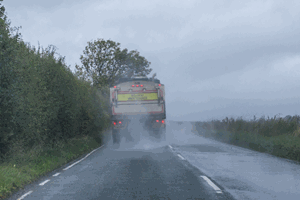
B
C
D
Correct Answer: A
Explanation: Large vehicles throw up a lot of spray when it's wet. This makes it difficult for following drivers to see the road ahead. You'll be able to see more by dropping back further, out of the spray. This will also increase your separation distance, giving you more room to stop if you have to.
Explanation: Large vehicles throw up a lot of spray when it's wet. This makes it difficult for following drivers to see the road ahead. You'll be able to see more by dropping back further, out of the spray. This will also increase your separation distance, giving you more room to stop if you have to.
Correct Answer: B
Explanation: The triangular shapes above and below the dimensions indicate a height restriction that applies to the road ahead.
Explanation: The triangular shapes above and below the dimensions indicate a height restriction that applies to the road ahead.
Correct Answer: B
Explanation: Road signs that prohibit overtaking are placed in locations where passing the vehicle in front is dangerous. If you see this sign, don't attempt to overtake. The sign is there for a reason; you must obey it.
Explanation: Road signs that prohibit overtaking are placed in locations where passing the vehicle in front is dangerous. If you see this sign, don't attempt to overtake. The sign is there for a reason; you must obey it.
Correct Answer: B
Explanation: In order to keep roads free from parked cars, there are some areas where you're allowed to park on the verge. Only do this where you see the sign. Parking on verges or footways anywhere else could lead to a fine.
Explanation: In order to keep roads free from parked cars, there are some areas where you're allowed to park on the verge. Only do this where you see the sign. Parking on verges or footways anywhere else could lead to a fine.
Correct Answer: D
Explanation: As you approach a roundabout, look well ahead and check all signs. Decide which exit you wish to take and move into the correct position as you approach the roundabout, signalling as required.
Explanation: As you approach a roundabout, look well ahead and check all signs. Decide which exit you wish to take and move into the correct position as you approach the roundabout, signalling as required.
Correct Answer: D
Explanation: This sign is found where a shallow stream crosses the road. Heavy rainfall could increase the flow of water. If the water looks too deep or the stream has spread over a large distance, stop and find another route.
Explanation: This sign is found where a shallow stream crosses the road. Heavy rainfall could increase the flow of water. If the water looks too deep or the stream has spread over a large distance, stop and find another route.
Correct Answer: C
Explanation: Whatever light is showing, you should know which light is going to appear next and be able to take appropriate action. For example, when amber is showing on its own, you'll know that red will appear next. This should give you ample time to anticipate and respond safely.
Explanation: Whatever light is showing, you should know which light is going to appear next and be able to take appropriate action. For example, when amber is showing on its own, you'll know that red will appear next. This should give you ample time to anticipate and respond safely.
Correct Answer: D
Explanation: You should stay in the left-hand lane of a motorway unless you're overtaking another vehicle. The right-hand lane of a motorway is an overtaking lane; it isn't the 'fast lane'. After overtaking, move back to the left when it's safe to do so.
Explanation: You should stay in the left-hand lane of a motorway unless you're overtaking another vehicle. The right-hand lane of a motorway is an overtaking lane; it isn't the 'fast lane'. After overtaking, move back to the left when it's safe to do so.
Correct Answer: C
Explanation: If you're travelling on a dual carriageway that becomes a single carriageway road, reduce your speed gradually so that you aren't exceeding the limit as you enter. There might not be a sign to remind you of the limit, so make sure you know the speed limits for different types of road and vehicle.
Explanation: If you're travelling on a dual carriageway that becomes a single carriageway road, reduce your speed gradually so that you aren't exceeding the limit as you enter. There might not be a sign to remind you of the limit, so make sure you know the speed limits for different types of road and vehicle.
15. You're joining a motorway. Why is it important to make full use of the slip road? Mark one answer
AB
C
D
Correct Answer: D
Explanation: Try to join the motorway without affecting the progress of the traffic already travelling on it. Always give way to traffic already on the motorway. At busy times you may have to slow down to merge into slow-moving traffic.
Explanation: Try to join the motorway without affecting the progress of the traffic already travelling on it. Always give way to traffic already on the motorway. At busy times you may have to slow down to merge into slow-moving traffic.
Correct Answer: B
Explanation: At roadworks, and especially where a contraflow system is operating, a speed restriction is likely to be in place. Keep to the lower speed limit and don't
- switch lanes
- get too close to the vehicle in front of you.
Be aware that there will be no permanent barrier between you and the oncoming traffic.
Explanation: At roadworks, and especially where a contraflow system is operating, a speed restriction is likely to be in place. Keep to the lower speed limit and don't
- switch lanes
- get too close to the vehicle in front of you.
Be aware that there will be no permanent barrier between you and the oncoming traffic.
17. When approaching a right-hand bend, you should keep well to the left. Why is this? Mark one answer
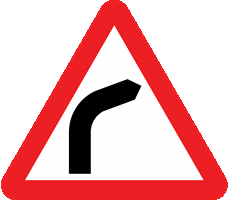
B
C
D
Correct Answer: B
Explanation: Doing this will give you an earlier view around the bend and enable you to see any hazards sooner. It also reduces the risk of collision with an oncoming vehicle that may have drifted over the centre line while taking the bend.
Explanation: Doing this will give you an earlier view around the bend and enable you to see any hazards sooner. It also reduces the risk of collision with an oncoming vehicle that may have drifted over the centre line while taking the bend.
Correct Answer: B
Explanation: Accelerating and braking gently and smoothly will help to save fuel and reduce wear on your vehicle. This makes it better for the environment too.
Explanation: Accelerating and braking gently and smoothly will help to save fuel and reduce wear on your vehicle. This makes it better for the environment too.
Correct Answer: A
Explanation: If you want to turn left and there's a cyclist in front of you, hold back. Wait until the cyclist has passed the junction and then turn left behind them. Don't try to intimidate them by driving too closely.
Explanation: If you want to turn left and there's a cyclist in front of you, hold back. Wait until the cyclist has passed the junction and then turn left behind them. Don't try to intimidate them by driving too closely.
Correct Answer: C
Explanation: Urban clearways are provided to keep traffic flowing at busy times. You may stop only briefly to set down or pick up passengers. Times of operation will vary from place to place, so always check the signs.
Explanation: Urban clearways are provided to keep traffic flowing at busy times. You may stop only briefly to set down or pick up passengers. Times of operation will vary from place to place, so always check the signs.
21. Other drivers may sometimes flash their headlights at you. In which situation are they allowed to do this? Mark one answer
AB
C
D
Correct Answer: D
Explanation: If other drivers flash their headlights, this isn't a signal to show priority. The flashing of headlights has the same meaning as sounding the horn: it's a warning of their presence.
Explanation: If other drivers flash their headlights, this isn't a signal to show priority. The flashing of headlights has the same meaning as sounding the horn: it's a warning of their presence.
A
B
C
D
B
C
D
Correct Answer: D
Explanation: If the road surface becomes very hot, it can soften. Tyres are unable to grip a soft surface as well as they can a firm dry one. Take care when cornering and braking.
Explanation: If the road surface becomes very hot, it can soften. Tyres are unable to grip a soft surface as well as they can a firm dry one. Take care when cornering and braking.
Correct Answer: C
Explanation: When following a cyclist, be aware that they have to deal with the hazards around them. They may wobble or swerve to avoid a pothole in the road or see a potential hazard and change direction suddenly. Don't follow them too closely or rev your engine impatiently.
Explanation: When following a cyclist, be aware that they have to deal with the hazards around them. They may wobble or swerve to avoid a pothole in the road or see a potential hazard and change direction suddenly. Don't follow them too closely or rev your engine impatiently.
Correct Answer: A
Explanation: Traffic-calming measures such as road humps, chicanes and narrowings are intended to slow drivers down to protect vulnerable road users. Don't speed up until you reach the end of the traffic-calmed zone.
Explanation: Traffic-calming measures such as road humps, chicanes and narrowings are intended to slow drivers down to protect vulnerable road users. Don't speed up until you reach the end of the traffic-calmed zone.
A
B
C
D
B
C
D
Correct Answer: D
Explanation: Where street repairs have closed off pavements, proceed carefully and slowly, as pedestrians might have to walk in the road.
Explanation: Where street repairs have closed off pavements, proceed carefully and slowly, as pedestrians might have to walk in the road.
Correct Answer: D
Explanation: When turning, long vehicles need much more room on the road than other vehicles. At junctions, they may take up the whole of the road space, so be patient and allow them the room they need.
Explanation: When turning, long vehicles need much more room on the road than other vehicles. At junctions, they may take up the whole of the road space, so be patient and allow them the room they need.
27. You're following a large vehicle approaching a crossroads. The driver signals to turn left. What should you do? Mark one answer
AB
C
D
Correct Answer: A
Explanation: Hold back and wait until the vehicle has turned before proceeding. Don't overtake, because the vehicle turning left could hide a vehicle emerging from the same junction.
Explanation: Hold back and wait until the vehicle has turned before proceeding. Don't overtake, because the vehicle turning left could hide a vehicle emerging from the same junction.
Correct Answer: C
Explanation: Smart motorway schemes are intended to reduce congestion and make journey times more reliable. In these areas, the hard shoulder may be used as a running lane to ease congestion at peak times or in the event of an incident. Variable speed limits are used to help keep the traffic moving and to avoid bunching.
Explanation: Smart motorway schemes are intended to reduce congestion and make journey times more reliable. In these areas, the hard shoulder may be used as a running lane to ease congestion at peak times or in the event of an incident. Variable speed limits are used to help keep the traffic moving and to avoid bunching.
Correct Answer: A
Explanation: A stationary bus at a bus stop can hide pedestrians who might try to cross the road just in front of it. Drive at a speed that will enable you to respond safely if you have to.
Explanation: A stationary bus at a bus stop can hide pedestrians who might try to cross the road just in front of it. Drive at a speed that will enable you to respond safely if you have to.
Correct Answer: D
Explanation: There are a number of things you can do to help, even without expert training. Be aware of further danger from other traffic and fire; make sure the area is safe. People may be in shock. Don't give them anything to eat or drink. Keep them warm and comfortable and reassure them. Don't move injured people unless there's a risk of further danger.
Explanation: There are a number of things you can do to help, even without expert training. Be aware of further danger from other traffic and fire; make sure the area is safe. People may be in shock. Don't give them anything to eat or drink. Keep them warm and comfortable and reassure them. Don't move injured people unless there's a risk of further danger.
Correct Answer: B
Explanation: If you're involved in a collision, head restraints will reduce the risk of neck injury. They must be properly adjusted. Make sure they aren't positioned too low: in a crash, this could cause damage to the neck.
Explanation: If you're involved in a collision, head restraints will reduce the risk of neck injury. They must be properly adjusted. Make sure they aren't positioned too low: in a crash, this could cause damage to the neck.
A
B
C
D
B
C
D
Correct Answer: B
Explanation: You shouldn't drive if you're taking medicine that could cause you to feel drowsy at the wheel. Ask someone else to drive or, if that isn't possible, find another way to get home.
Explanation: You shouldn't drive if you're taking medicine that could cause you to feel drowsy at the wheel. Ask someone else to drive or, if that isn't possible, find another way to get home.
33. You're waiting at a level crossing. The red warning lights continue to flash after a train has passed by. What should you do? Mark one answer
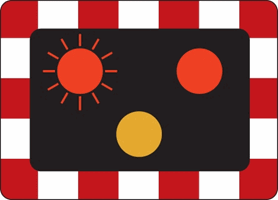
B
C
D
Correct Answer: A
Explanation: At a level crossing, flashing red lights mean you must stop. If the train passes but the lights keep flashing, wait. Another train may be coming.
Explanation: At a level crossing, flashing red lights mean you must stop. If the train passes but the lights keep flashing, wait. Another train may be coming.
34. Your car needs to pass an MOT test. What may be invalidated if you drive the car without a current MOT certificate? Mark one answer
AB
C
D
Correct Answer: C
Explanation: If your vehicle requires an MOT certificate, it's illegal to drive it without one and your insurance may be invalid if you do so. The only exceptions are that you may drive to a pre-arranged MOT test appointment, or to a garage for repairs required for the test.
Explanation: If your vehicle requires an MOT certificate, it's illegal to drive it without one and your insurance may be invalid if you do so. The only exceptions are that you may drive to a pre-arranged MOT test appointment, or to a garage for repairs required for the test.
Correct Answer: B
Explanation: Car tyres must have sufficient depth of tread to give them a good grip on the road surface. The legal minimum for cars is 1.6 mm. This depth should be across the central three-quarters of the breadth of the tyre and around the entire circumference.
Explanation: Car tyres must have sufficient depth of tread to give them a good grip on the road surface. The legal minimum for cars is 1.6 mm. This depth should be across the central three-quarters of the breadth of the tyre and around the entire circumference.
Correct Answer: D
Explanation: It's illegal to use a hand-held mobile phone while driving, except in a genuine emergency. Even using a hands-free kit can distract your attention. Park in a safe and convenient place before receiving or making a call or using text messaging. Then you'll also be free to take notes or refer to papers.
Explanation: It's illegal to use a hand-held mobile phone while driving, except in a genuine emergency. Even using a hands-free kit can distract your attention. Park in a safe and convenient place before receiving or making a call or using text messaging. Then you'll also be free to take notes or refer to papers.
Correct Answer: D
Explanation: Try not to use your car as a matter of routine. For shorter journeys, consider walking or cycling instead - this is much better for both you and the environment.
Explanation: Try not to use your car as a matter of routine. For shorter journeys, consider walking or cycling instead - this is much better for both you and the environment.
Correct Answer: B
Explanation: Anti-lock brakes won't be needed when you're braking normally. Looking well down the road and anticipating possible hazards could prevent you from having to brake late and harshly. Knowing that you have anti-lock brakes isn't an excuse to drive in a careless or reckless way.
Explanation: Anti-lock brakes won't be needed when you're braking normally. Looking well down the road and anticipating possible hazards could prevent you from having to brake late and harshly. Knowing that you have anti-lock brakes isn't an excuse to drive in a careless or reckless way.
Correct Answer: C
Explanation: A heavy load on your roof rack will reduce the stability of the vehicle because it moves the centre of gravity away from that designed by the manufacturer. Be aware of this when you drive round bends and corners. If you change direction at speed, your vehicle and/or load could become unstable and you could lose control.
Explanation: A heavy load on your roof rack will reduce the stability of the vehicle because it moves the centre of gravity away from that designed by the manufacturer. Be aware of this when you drive round bends and corners. If you change direction at speed, your vehicle and/or load could become unstable and you could lose control.
Correct Answer: B
Explanation: You should brake and slow down before selecting a lower gear. The gear can then be used to keep the speed low and help you control the vehicle. This is particularly helpful on long downhill stretches, where brake fade can occur if the brakes overheat.
Explanation: You should brake and slow down before selecting a lower gear. The gear can then be used to keep the speed low and help you control the vehicle. This is particularly helpful on long downhill stretches, where brake fade can occur if the brakes overheat.
Correct Answer: C
Explanation: Try to be ready for the unexpected. Plan ahead and learn to anticipate hazards. You'll then give yourself more time to react to any problems that might occur. Be tolerant of other road users who don't behave correctly.
Explanation: Try to be ready for the unexpected. Plan ahead and learn to anticipate hazards. You'll then give yourself more time to react to any problems that might occur. Be tolerant of other road users who don't behave correctly.
Correct Answer: D
Explanation: Extra care should be taken in wet weather. On wet roads, your stopping distance could be double that in dry conditions.
Explanation: Extra care should be taken in wet weather. On wet roads, your stopping distance could be double that in dry conditions.
Correct Answer: D
Explanation: Alcohol can increase confidence to a point where a driver's behaviour might become 'out of character'. Someone who normally behaves sensibly might suddenly enjoy taking risks. Never let yourself or your friends get into this situation.
Explanation: Alcohol can increase confidence to a point where a driver's behaviour might become 'out of character'. Someone who normally behaves sensibly might suddenly enjoy taking risks. Never let yourself or your friends get into this situation.
A
B
C
D
B
C
D
Correct Answer: C
Explanation: It's illegal to pour engine oil down any drain. Oil is a pollutant and harmful to wildlife. Dispose of it safely at an authorised site.
Explanation: It's illegal to pour engine oil down any drain. Oil is a pollutant and harmful to wildlife. Dispose of it safely at an authorised site.
A
B
C
D
B
C
D
Correct Answer: A
Explanation: It's an offence to park on the zigzag lines of a zebra crossing. You'll be causing an obstruction by obscuring the view of both pedestrians and drivers.
Explanation: It's an offence to park on the zigzag lines of a zebra crossing. You'll be causing an obstruction by obscuring the view of both pedestrians and drivers.
A
B
C
D
B
C
D
Correct Answer: A
Explanation: Your brake lights will give an indication to traffic behind that you're slowing down. Good anticipation will allow you time to check your mirrors before slowing.
Explanation: Your brake lights will give an indication to traffic behind that you're slowing down. Good anticipation will allow you time to check your mirrors before slowing.
Correct Answer: B
Explanation: If you have to drive in fog, switch your dipped-beam headlights on and keep your windscreen clear. You should always be able to pull up within the distance you can see ahead.
Explanation: If you have to drive in fog, switch your dipped-beam headlights on and keep your windscreen clear. You should always be able to pull up within the distance you can see ahead.
Correct Answer: D
Explanation: The vehicle you drive must be roadworthy and in good condition. If it's over three years old, it must pass an MOT test to remain in use on the road. Vehicles made before 1960 are exempt from the MOT test, but they must be in a roadworthy condition before being driven on the road.
Explanation: The vehicle you drive must be roadworthy and in good condition. If it's over three years old, it must pass an MOT test to remain in use on the road. Vehicles made before 1960 are exempt from the MOT test, but they must be in a roadworthy condition before being driven on the road.
49. You're in a tunnel. Your vehicle is on fire and you can't drive it. What should you do? Mark one answer
AB
C
D
Correct Answer: D
Explanation: It's usually better to drive a burning vehicle out of a tunnel. If you can't do this, pull over and stop at an emergency point if possible. Switch off the engine, use hazard warning lights, and leave the vehicle immediately. Call for help from the nearest emergency point. If you have an extinguisher it may help to put out a small fire, but don't try to tackle a large one.
Explanation: It's usually better to drive a burning vehicle out of a tunnel. If you can't do this, pull over and stop at an emergency point if possible. Switch off the engine, use hazard warning lights, and leave the vehicle immediately. Call for help from the nearest emergency point. If you have an extinguisher it may help to put out a small fire, but don't try to tackle a large one.
Correct Answer: A
Explanation: Never stop on the hard shoulder to rest. If there's no service area for several miles, leave the motorway at the next exit and find somewhere safe and legal to pull over.
Explanation: Never stop on the hard shoulder to rest. If there's no service area for several miles, leave the motorway at the next exit and find somewhere safe and legal to pull over.



